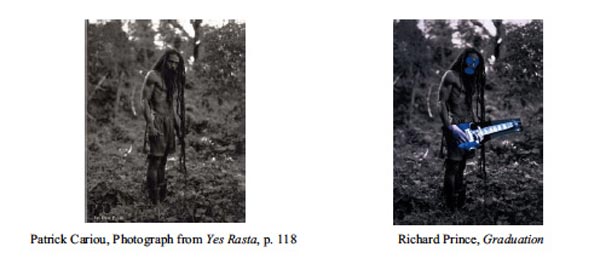The court sided with Richard Prince in his case against Patrick Cariou
The Court of Appeal found that in 25 of the 30 series of works Canal Zone Richard Prince "lawful use" photographer Patrick Cariou. The case of the remaining five papers back to the District Court

Left: Patrick Cariou Photo from the book Yes Rasta. Pp. 118
Right: RICHARD PRINCE Exhaust
Source:
Court began to side of the artist Richard Prince in his case against the photographer Patrick Cariou. Court of Appeals for the Second Circuit United States acknowledged that in 25 of the 30 series of works Canal Zone Richard Prince "lawful use" photographer Patrick Cariou. thing about the remaining five papers back to the district court. At the loud over the years proceeding the copyright won artist apropriator.
briefly recall the essence of the dispute: the end of 2008 in a New York gallery Gagosian (Larry Gagosian) was an exhibition of works Prince called the Canal Zone («Panama Canal Zone"), which exhibited paintings of Jamaican rastamanov. To create these works the artist used Cariou photos from the book Yes Rasta, published in 2000. In January 2009, Cariou sued Prince, accusing him of copyright infringement . Two years later, March 2011, the U.S. Supreme Court recognized the Prince guilty . All paintings in the possession of the artist and his dealer Gagosian, was ordered to seize and destroy.
However, Prince and representing its interests Gagosian Gallery appealed to the federal appeals court in New York, which recently overturned a previous decision of the District Court. Much of the work Prince (25 of 30) was considered sufficient "transformation" and, therefore, the use of original images Cariou falls under the term "fair use» («fair use») and is not an infringement of copyright. "These 25 works of Prince are very different aesthetic than the photos Cariou, - concluded the judge Parker. - If the peace-loving portraits and landscapes Cariou with well-designed composition convey the natural beauty of rastamanov and the surrounding nature, the rough and sharp of Prince, by contrast, looks messy and provocative. "In addition, black-and-white pictures Patrick Cariou Prince greatly misrepresented, turned many of them in collages, added color. Ie 25 works accepted a "transformation" in spite of the fact that Richard Prince himself does not consider them as such. Even before the first court decision in 2011, he said that the true meaning of his work Cariou not much interested in, any message or comment he did not put his alterations, he just wanted to create a "big picture, which would be very well looked good." However, in the opinion of the court, it is not that he thinks himself an artist, but in the how the viewer perceives the altered work.
For the remaining five works of the appellate court decisions are not made, because in this case the transformation was not sufficient to recognize the use of lawful. Court could not unequivocally conclude that these five works are some new idea or message. speech, in particular, is the work of "Graduation," in which Prince sketched eyes and mouth Rastaman blue and pasted picture of the guitar, but the overall picture has left almost Cariou without changes. outcome of this and four other works will be addressed in the district court.
Prepared by Mary Onuchina, AI
Source:
Permanent link to:
https://artinvestment.ru/en/news/artnews/20130429_prince_vs_cariou.html
https://artinvestment.ru/news/artnews/20130429_prince_vs_cariou.html
© artinvestment.ru, 2025
Attention! All materials of the site and database of auction results ARTinvestment.RU, including illustrated reference information about the works sold at auctions, are intended for use exclusively for informational, scientific, educational and cultural purposes in accordance with Art. 1274 of the Civil Code. Use for commercial purposes or in violation of the rules established by the Civil Code of the Russian Federation is not allowed. ARTinvestment.RU is not responsible for the content of materials submitted by third parties. In case of violation of the rights of third parties, the site administration reserves the right to remove them from the site and from the database on the basis of an application from an authorized body.

